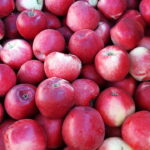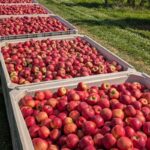SPS measures holding back U.S. produce exports to Asia

From "burdensome" processes for approving pesticides in some countries to lengthy pest risk assessments in others, the U.S. Trade Representative (USTR) has listed several barriers affecting produce exports. The "2013 Report on Sanitary and Phytosanitary Measures" offers an in-depth explanation of how these issues are affecting U.S. business around the world. In light of China's latest measures against U.S. citrus shippers, we take a look at some of the non-tariff issues mentioned in China and other parts of the continent. 
As a foreword to the report, Acting U.S. Trade Representative Demetrios Marantis said many sanitary and phytosanitary measures (SPS) were justified, but that "too often governments cloak discriminatory and protectionist trade measures in the guise of ensuring human, animal or plant safety".
"USTR is committed to identifying and combating unwarranted SPS barriers to U.S. food and agricultural exports," he said.
To highlight how important it was to dismantle these barriers, Marantis mentioned the achievements of pear access in China and the improvement of cherry export procedures to South Korea since the last report was published in 2012.
Pesticide concerns
A common theme throughout the report was the issue of maximum residue limits (MRLs) and pesticide or fungicide approvals, especially in Taiwan and South Korea.
"Taiwan’s slow and cumbersome process for adopting MRLs for pesticides has resulted in a substantial backlog of MRL applications and is creating a significant level of uncertainty within the U.S. agricultural community," the report said.
"While the United States is encouraged by Taiwan’s ongoing efforts to work through the backlog of MRL applications, shipments of some U.S. agricultural products remain at risk of rejection due to the absence of MRLs for some commonly used pesticides, which have already undergone rigorous health and safety review in the United States."
The products mentioned that were affected by Taiwan's slow processes were cherries, apples, wheat, barley, potatoes, strawberries, almonds and corn.
The report said U.S. apple shipments to Taiwan were worth US$85 million last year as its fourth-largest market, but a "three strikes" policy towards coddling moth detections led to uncertainty for growers and exporters.
The paper also made note of a "unique and complicated" deferral process for South Korea when no MRLs were established.
"Korea has increased pesticide residue testing on U.S. commodities due to residue violations occurring in other countries.
"After a single MRL violation by a U.S. export (including one detected by authorities of another country), Korea imposes restrictive requirements on that product’s grower, shipper, and importer, and requires that they must make a certain number of compliant shipments before the sanctions are removed."
Cherry difficulties
Systems for cherry market access were also a common theme for Japan and South Korea; the former especially due to its restrictions on new varieties, leading the USTR to urge for a "rapid resolution".
"With regard to fumigation treatments, Japan only approves imports of new fresh cherry varieties based on individual fumigation trials.
"This burdensome process, which involves testing the efficacy of fumigation treatments for each separate variety, restricts the entry of new cherry varieties into the Japanese market.
"The United States is urging Japan to accept fresh sweet cherries as a single commodity under a single fumigation protocol, which would mean that all varieties may be imported without the need for separate testing."
On the topic of South Korea, the report advised replacing fumigation requirements with other treatments for cherry imports. It said this would address phytosanitary concerns while improving shelf life, allowing for ocean vessel exports instead of air freight, thus reducing transport costs.
Officials from both countries have been negotiating alternative options since 2008, and the report said they continued to work on the issue.
The Chinese situation
China started to allow two types of U.S. apples into its market in 1995, and since then it has raised concerns about fire blight and fungal pathogens as reasons to not allow imports of more varieties.
"Additionally, in 2012 China suspended imports of apples from Washington due to concerns regarding three fungal pathogens," the report said.
"Discussions are ongoing regarding the development of a mutually acceptable pest list to support the U.S. access request for additional apple varieties and to address China’s quarantine concerns about apples from Washington."
The report also discussed attempts to gain permanent strawberry market access in China.
"In 2008, AQSIQ allowed California strawberries to be imported for the Olympic and Paralympic Games in Beijing. At that time, Chinese authorities acknowledged that California strawberries were safe.
"However, USDA has since sought permanent access, and while China has not provided any scientific justifications for its delay, a decision on permanent access has not been granted."
Philippine delays
Another important matter raised in the report was the amount of time taken by Philippine authorities to conduct PRAs on U.S.-grown broccoli, cauliflower, lettuce, carrots, cabbage, and celery, which were requested to be made in 2006. The U.S. also asked for a PRA on its potatoes in 2009.
"The United States is concerned with the length of time that it takes for the Philippines to complete PRAs for fresh vegetables," the report said.
"The Department of Agriculture (DA) provided its PRAs for these products to the United States in May 2011, and USDA is currently evaluating them.
"Until the entire PRA process, including agreement on the PRA results and pest mitigations, is completed for each product, the DA will only allow a limited amount of these vegetables to enter the country, on a case-by-case basis, for “high-end markets,” such as hotels, restaurants, and airline companies."
Elsewhere in South East Asia, the report raised concerns about exporter registration requirements, sampling rates and the coverage of MRLs in Vietnam.














































